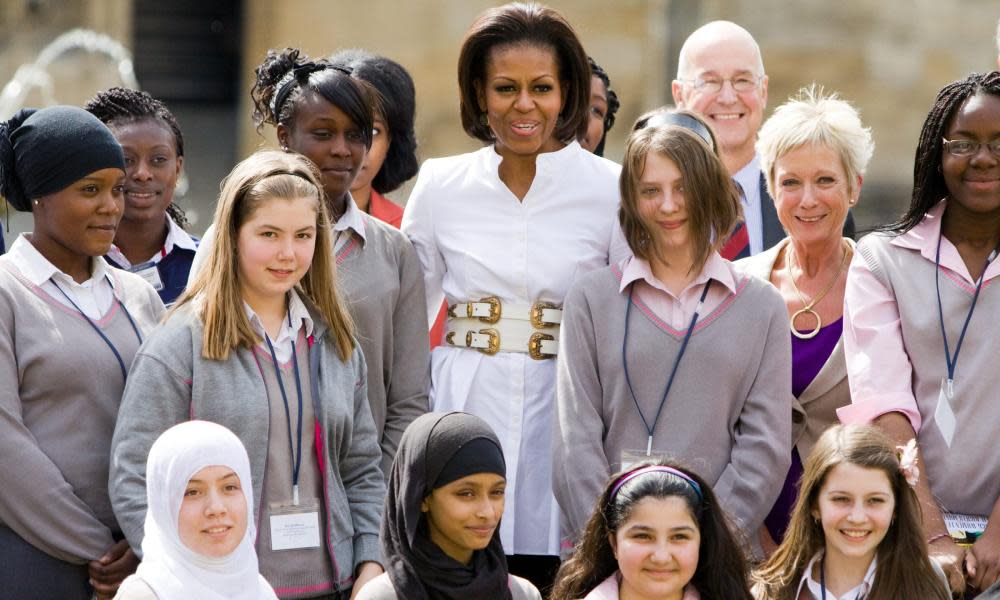‘Michelle Obama gave us a sense of possibility, self-belief and confidence’

Michelle Obama wasn’t expecting the overwhelming emotion she felt when she visited Elizabeth Garrett Anderson school in 2009. “I wasn’t fully prepared to feel what I did,” she writes in her memoir Becoming. “The building itself was nothing special – a boxy brick building on a nondescript street. But as I settled into a folding chair onstage and started watching the performance … something inside me began to quake. I almost felt myself falling backward into my own past.”
Sabrina Chowdhury, now 25 and a primary school teacher, was one of a handful of Year 11 girls picked to greet the first lady on that bright April morning. “Obviously I was nervous,” she says. “Meeting new people was always nerve-racking at that age, and this was the first lady of the United States. It was an adrenaline-fuelled experience but she had a very warm demeanour. She looked kind and not intimidating at all – she made you feel comfortable in her presence quite quickly.”
A special assembly followed as the world’s press, US secret service, counter-terrorism officers and the Metropolitan police awkwardly gathered in the main hall of the all-girls’ school in Islington, London, where pupils performed a Shakespeare scene, modern dance and a Whitney Houston rendition.
When it was Obama’s turn to deliver a speech, she dismissed her notes. She recalls in her book: “Looking up at the girls, I just began to talk, explaining that though I had come from far away … I was more like them than they knew.” When she watched the girls, Obama said that she “knew they’d have to push back against all the stereotypes that would get put on them, all the ways they’d be defined before they’d had a chance to define themselves. They’d need to fight the invisibility that comes with being poor, female and of colour.”
Back then, 20% of Elizabeth Garrett Anderson’s 900 pupils were refugees in a student body where 55 languages were spoken. Headteacher Jo Dibb, who arrived at the school in 2005, proudly notes: “We reflect all the communities that make up London – and we are high-achieving.”
In Dibb’s modest office, an Obama-family signed Christmas card from the White House is pinned on the noticeboard. A photo from the day of the visit is framed, alongside a thank-you note from Obama sent three weeks later. “Your students are such an inspiration,” it reads. Was it a life-changing moment?
“I’d like to think it was for her too,” says Dibb with emotion. “I cried on Tuesday when I saw what she wrote [about the school]. I’d just come out of the gym and the news story had been Whatsapped to me by someone and I sat in my car at seven in the morning reading it.”

Obama’s staff sent Dibb an advance copy of the book the same day. “If we have been part of what Michelle Obama has done in the wider sphere,” she pauses. “Well, just wow. That makes me feel as if we’ve done something special.”
Obama credits Elizabeth Garrett Anderson for inspiring her subsequent focus on education initiatives. She made a point of keeping the relationship going and wrote letters to the girls “who had so profoundly moved me” to encourage them to “stay hopeful and keep working, despite their lack of privilege”.
In 2011 she visited again, taking 30 of the girls on a tour of Oxford University; in 2012 she invited Dibb and a dozen pupils to the White House. When the Obamas visited the Olympics later that summer, Michelle made sure to send a gift – “a beautiful leather-bound mini-atlas” – to the headteacher. “She definitely impacted me in so many ways, just this sense of possibility, self-belief and confidence which she gave to everyone,” says Clarissa Pabi, now a senior marketing manager in publishing and the producer of Mostly Lit podcast. Pabi, 27, is an Elizabeth Garrett Anderson alumnus but first met Obama as an Oxford undergraduate in 2011, having been asked to make a speech alongside the first lady in Christ Church hall.
“She gave me so much advice about life and relationships and supporting other women. She talked about things around success and it not being about where you’re from but the effort you’re willing to invest – there was just so much wisdom.” Pabi is effusive about the experience and says she still gets goosebumps thinking about it. “It absolutely changed my life, I can look back and trace the trajectory from that moment.”
For Chowdhury, Michelle Obama was “monumental – it was an honour to be in the same room as her”. Obama wrote about feeling lost and uncertain about her purpose in those first two months in the role but that “finally, speaking to those girls, I felt something completely different and pure – an alignment of my old self with this new role.” She told the students “that they’d touched my hearts … that they were precious”.
Chowdhury says the speech was “genuinely moving, we were all really inspired”. And though she was always driven in school, “as a teenage girl those are really important things to hear from grown-up women … It made me more confident. I always wanted to have a career and work in a sector where I’m helping others, I always knew I wanted to give back to the community I’m from.”
Michelle Obama is, says Dibb, “part of our history; her relationship with the school is integral to who we are now”.
She is overjoyed that the impact was mutual. “Self-esteem and self-belief are critical if young girls are going to maximise their potential and [Michelle Obama’s] visit improved the esteem of the school, it improved the belief the girls had in themselves because here was the most powerful woman in the world telling them that they could do it.” Dibb beams. “She reinforced everything we’ve been trying to say.”

 Yahoo News
Yahoo News 
